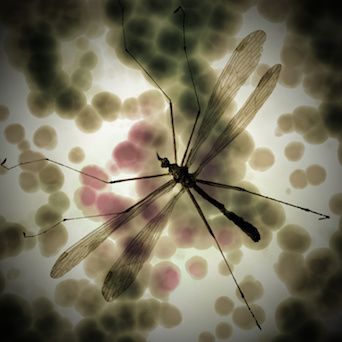Blocking Vector-Borne Disease in Humans With Veterinary Parasiticides
Scientists have long been searching for effective methods to prevent debilitating or deadly vector-borne diseases in humans around the world. Now, a new study suggests that veterinary parasiticides may be what they have been looking for all along.

Recently published in Proceedings of the National Academy of Sciences, a new study suggests that isoxazoline drugs used for ectoparasite control in animals can be repurposed to prevent a host of vector-borne diseases in people.
The class of drugs known as isoxazolines includes fluralaner and afoxolaner—both of which are active ingredients in various flea and tick products for pets. The investigators found that this drug class is also effective against sand fly and mosquito species that feed on humans and leave infection in their wake.
According to the international research team, this finding “holds promise for expanding the concept of drug-based vector control from malaria to leishmaniasis and arboviral diseases.”
RELATED:
- Role of Mosquito Microbiota in Reducing Malaria Transmission
- Zika Virus: Talking Points for Veterinarians
The investigators conducted experiments in which fluralaner and afoxolaner rapidly killed Anopheles, Aedes, and Culex mosquitoes, as well as Phlebotomus sand flies, after the insects were fed a drug-supplemented blood meal.
Based on allometric scaling of animal pharmacokinetics data, the researchers then gauged how well these 2 drugs could prevent human vector-borne disease. Their prediction? A single human dose of afoxolaner (260 mg) or fluralaner (410 mg) could provide 50 to 90 days of prevention against diseases caused by mosquitoes and Phlebotomus sand flies.
It is important to note that isoxazolines do not prevent bites by these insects or the resulting infections; rather, the insect dies quickly after taking a blood meal, thus reducing the risk for further disease transmission to others.
Using computer epidemiology modeling, the team further predicted that seasonal mass drug administration of this single dose to less than a third of the human population in endemic regions could prevent more than 97% of all Zika virus cases and more than 70% of all malaria cases.
“Isoxazolines therefore represent a promising new component of drug-based vector control,” the investigators wrote.
Over the next 2 years, the team will evaluate the safety and efficacy of these drugs in humans.